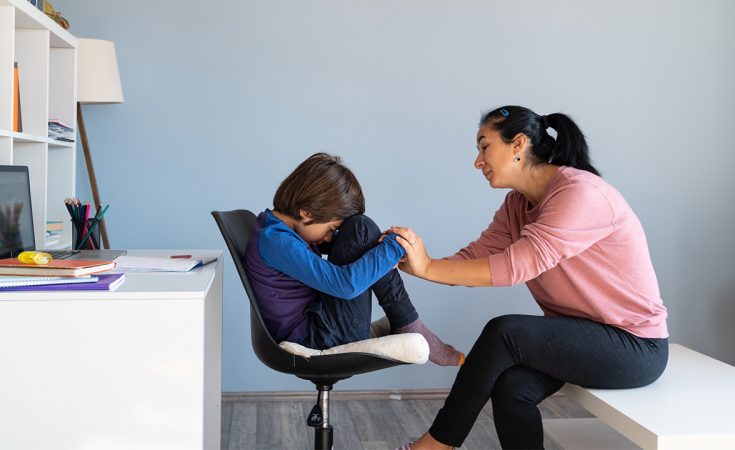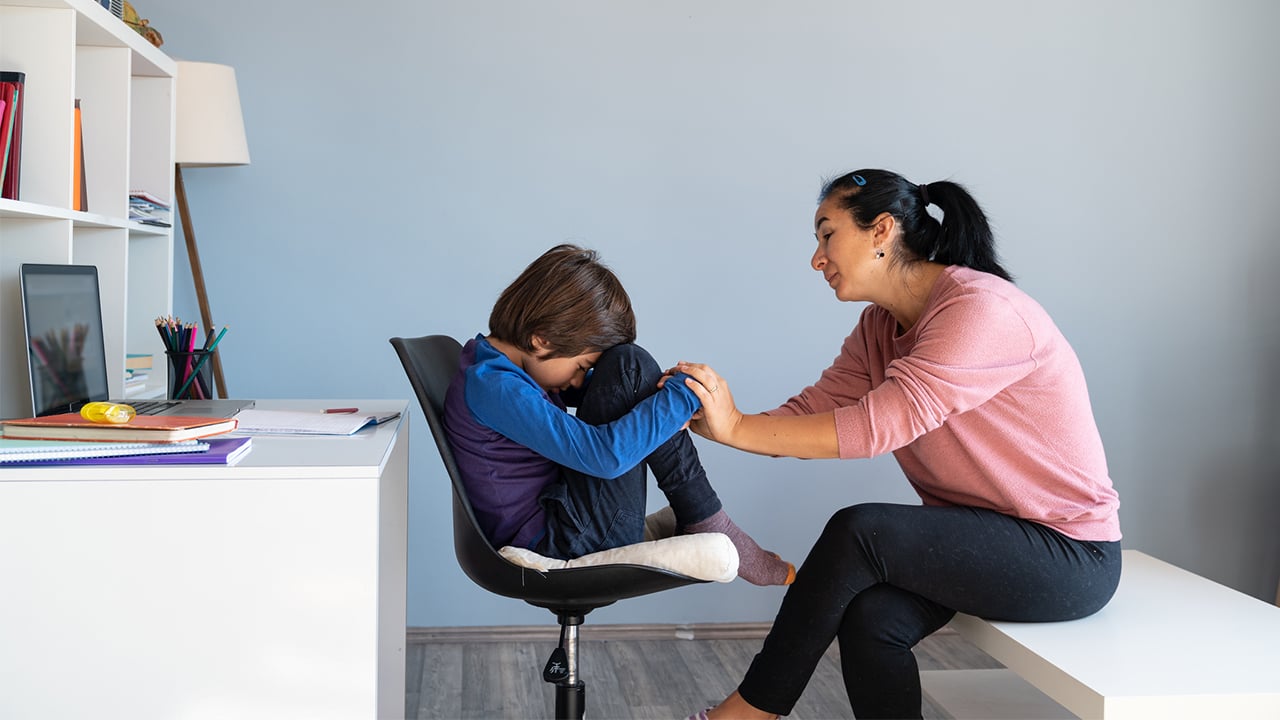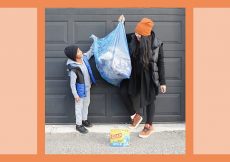Here is what has particularly chewed me up during this latest round of school closures in Ontario, the province that has deprived its children of education and normalcy more than any other in Canada, and more than virtually any other jurisdiction in the world: it feels like we are all actors in a commercial that says things are basically fine when they are manifestly not.
We are all muddling through a situation that was forced on us, because this is what we need to do for our kids, our jobs and whatever remains of ourselves. But the longer we keep finding a way to soldier through this, the more it feels like we are aiding and abetting the colossal lie that this is okay, that this was a reasonable and necessary choice, that there is not massive damage being sustained by these decisions every day, with the full, horrifying toll unknowable for years.
I gave serious thought to deliberately and completely opting out of “virtual learning” this time around, for reasons both practical and symbolic. On a practical level, my kids hate it—or rather, my incandescently bright Grade 2 student, who has not had a normal school year since she was in junior kindergarten, hates it to the point of tears. Her brother, now in junior kindergarten himself, in what I desperately hoped would be a somewhat normal school year, has yet to learn the hell of online learning.
So I considered giving an answer I have not given before to any of the impossible, punitive things that parents of young kids have been asked to do over the last two years: No. I will not. I refuse. It would have felt satisfying to adopt the stance that this is not a meaningful education in any way—and even if it was, closing schools is not helpful to the project of supposedly containing COVID-19—and I resent being made to play along as though it is.
Eventually, I talked myself off that rage ledge because I realized it would have no effect beyond depriving my kids of whatever small benefits they might get from seeing their friends and teachers through a screen. So we will do whatever we can do without causing tears to any of us, and no more.
But I still think people need to see what this actually looks like on the ground, how impossible and cruel and ridiculous it is.
So this is what that looks like in my house, which is probably more or less representative of others going through this, except for a couple of very large asterisks. My husband and I both have portable and flexible jobs, so we can be at home to supervise our children, even if the balancing act of trying to do that and work is absolutely impossible and terribly costly. But we can do it, we are here. I literally have no idea how people with on-site jobs, hourly wage workers who lose a shift or get fired if they can’t come in, are handling this. We are lucky to have a comfortable middle-class life where our kids have quiet space in which to work, access to technology, an internet connection and whatever supplies and help they need to try to learn something or take at least some enjoyment from online school.
Our school also has a large proportion of low-income families. There is a breakfast and lunch program, and a clothing cupboard for those who need them. That has all been wiped out for those most fragile kids and families in our community, for at least the next two weeks and for months and months before this, and many teachers will be unable to reach those students and families because of language or technology barriers. They will disappear into the neglected shadows until the province sees fit to reopen schools, but even when that happens, those lost hours, essential needs and connections will never be recovered.
This is absolutely awful for my family and we have every advantage we could wish for to deal with it. It is no less than catastrophic for so many others.
Both of my kids have wonderful teachers that I am incredibly grateful for, and throughout this terrible experiment of the last two years, I have often felt a deep kinship with the people in the classroom trying their absolute best for my kids and for all of us. This is not about teachers. This is about the horrible reality of virtual learning, and the provincial decision that has been made, over and over, to shutter schools and force teachers, kids and families to do this.
Here is the Grade 2 schedule for my daughter:
8-10 English Teacher
10-10:50 Lunch/Recess
10:50- 12:50 French Teacher
12:50-1:30 Lunch/Recess
1:30-2:30 Independent offline work
That looks okay, right? Not great, but doable? Two-hour blocks of online class for a reasonably independent seven-year-old? Sure. We need to have snacks or lunch and outdoor gear ready to go for each of those recess breaks so she can get some outside time, and then she’s done at 2:30 and we have to find a way to keep her busy until we can finish our workday, but I guess that’s doable.
Now here is my son’s junior kindergarten schedule:
8:00-8:40 Circle Time (online)
8:40-9:40 Independent Learning Time (offline)
9:40-10:00 Circle Time (online)
10:00-10:50 Lunch/Recess
10:50-11:30 Circle Time (online)
11:30 – 12:30 Independent Learning Time (offline)
12:30-12:50 Circle Time (online)
12:50-1:30 Lunch/Recess
1:30-2:00 Daily Physical Activity (online)
2:00-2:30 Sharing and Goodbye (online)
Cross-reference those two schedules and you’ll understand why a friend with kids in the same grades texted me right after receiving her child’s JK schedule, “I got in bed to cry.” Of course it’s impossible to keep kindergarteners engaged online for long, so the day has to be broken up like this. But each time there is a break, you have to get your child set up with a snack or activity. Each time they go back online, you have to get them signed in, and then you have to sit right beside them while they’re meeting with their class, because of course a four-year-old can’t navigate a conference call alone. You get them dressed and send them outside for “recess” so they don’t climb the curtains, then you set a timer for yourself and try to get some work done before you have to call them in for the next online session.
And none of this is what school and childhood is supposed to be, none of this makes kids the least bit happy or contented. They should be hands-on, collaborating and talking and drawing and learning and socializing together. They should be running around at recess with a big pack of kids, not wandering with a sibling or alone in their own front yard.
So how do you do this? How do you do this and do your job? How do you do this and feel like you are even remotely giving your kids what they need? How do you do it and feel like you are giving your job and your adult, outside-the-house self anything close to what it demands? How do you do this while hearing that nothing is more important than our kids, but knowing that at no point will a decision be made that upholds that bromide? How do you do it while countless medical officers of health state plainly that schools do not drive transmission and they are essential?
The people living this don’t even have the energy right now to scream about how horrible this is. Meanwhile, the loudest voices are the panicked ones who insist schools must be closed no matter what. I’d like to point out that if you personally feel that it is unsafe for your children to be in school, you can absolutely make the choice to keep them home, but it is appalling and telling to screech that everyone else should be forced to make the same choice.
While I have been furiously banging out this column, my kindergartener has been sitting in his desk directly in front of me, tuned into circle time with his class. In the space of a 40-minute class session, he yelped “Something happened” four or five times when the computer misbehaved, and required my help for supplies, tech support or other direction another half-dozen times. Of course he did. He’s four, and he should be in a classroom right now, sitting on a rug alongside his friends for circle time.
My seven-year-old has thundered down the stairs near tears in frustration because she lost track of what her teacher wanted her to do, and because she’s trapped in her bedroom alone looking at her friends on a screen instead of playing in the snow or sitting in a classroom with them. So my husband ran upstairs to help her, while I crouched beside my son helping him, then I went back to writing in half-sentence bursts between requests for help.
Again, we are the lucky ones, and we are ready to crack three hours into the first day. We cannot as a society fathom what this is going to cost us, most of all the people who can least afford to absorb further losses.
Things that might not be obvious if you don’t have young kids in your life right now: when kids don’t go to school, they don’t sleep. They have too much energy that hasn’t been used, and a deep, under-the-surface sort of surly sadness that comes of being isolated. They act out, they become different people. The spark goes out of normally sunny kids, their eyes like windows with the shades drawn, or volcanoes of fiery frustration well up within them. This awfulness has gone on so long that when our kids have trouble, my friends and I can no longer tell what’s just them, what’s a normal developmental stage, what’s pandemic damage or what we might be able to blame ourselves for because of the kind of parents we have been forced to become.
Any parenting book will tell you that what kids need and crave above all else is stability, routine and predictability. The pandemic has forced so much upheaval on us that we could not control or avoid. But protracted, ongoing school closures are now a deliberate choice that has been made in some jurisdictions and not in others, and it has enormous, known costs and negligible benefits.
I can only hope that eventually, the children and teenagers we have done this to will forget the feeling of being thrown under the bus, treated not as real people with needs or rights but as cheap collateral damage, that they will somehow eventually unlearn these lessons about not being able to count on anything. But I doubt they will entirely, and I know no parent who has been through this ever will either.
People keep repeating “kids are resilient,” using it like a get-out-of-jail-free incantation that absolves them of every cruel and cowardly decision. It’s not endlessly true, and even if it were, why would you designate children as the people in society who have to absorb the burden of your decisions and bounce back for the sake of the adults around them feeling okay about their priorities?
It will be years before we fully count up the damage this has done. By then, the people responsible will be long gone from public office. So while this is happening, everyone should at least look very directly at what it means, how it is playing out and what it is costing our children—and so what it will cost all of us in the long run.
No one is fine here. This is not okay. We will keep staggering through this somehow and do the best we can for our kids, because what other choice do we have?
But this is not a real education or a real childhood. We should all stop playing along like it is.



































